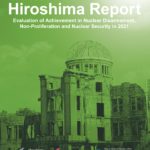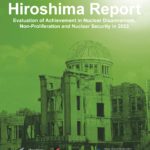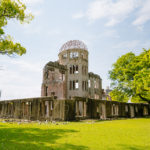Hiroshima Report 2018(12) DISARMAMENT AND NONPROLIFERATION EDUCATION AND COOPERATION WITH CIVIL SOCIETY
Regarding cooperation with civil society in nuclear disarmament and non-proliferation, involvement of civil society in the process of formulating the TPNW was notable. As was at the Open-ended Working Group (OEWG) to take forward multilateral nuclear disarmament negotiations held in 2016, civil society was invited to the United Nations Conference to Negotiate a Legally Binding Instrument to Prohibit Nuclear Weapons, Leading towards Their Elimination in 2017, where hibakusha, NGO and other organizations made statements and submitted official documents. Among them, the ICAN took an initiative towards the conclusion of the treaty with the Austria and other countries, and was awarded the Nobel Peace Prize as described above.
The NPDI submitted a working paper to the 2017 NPT Review Conference, in which they argued that educating young people, especially teenagers, is most crucial, and “[t]he amassed knowledge and experience of the realities of atomic bombings should also be passed on to younger generations, so that they can actively engage in disarmament and non-proliferation issues.”186 Japan, which has attached importance to such activities, held a discussion meeting with 22 high school students as Youth Communicators for a World without Nuclear Weapons, and Japanese and other countries’ officials and experts on disarmament issues at the Delegation of Japan to the Conference on Disarmament in August 2017.
Side events held during the NPT RevCon and the First Committee of the UNGA, where NGOs can participate, are also important elements of the efforts toward civil society cooperation.187 During the 2017 NPT PrepCom, Australia, Austria, Canada, France, Germany, Japan, Kazakhstan, South Korea, New Zealand, Mexico, Norway, Sweden, Switzerland, the United Kingdom, the United States and others hosted such events. And during the 2017 UNGA, Australia, Austria, Canada, Chile, Germany, Japan, Kazakhstan, Mexico, the Netherlands, Norway, Poland, Switzerland, the United Kingdom and others hosted such events.
Regarding cooperation with civil society, one of the important efforts for governments is to provide more information on nuclear disarmament and nonproliferation matters. Among the countries surveyed in this report, the following set up a section or sections on disarmament and non-proliferation on their official homepages (in English) and posted enlightening information: Australia, Austria, Belgium, Canada, China, France, Germany, Japan, New Zealand, Sweden, Switzerland, the United Kingdom and the United States.
Finally, a few countries started to legislate “divestment” against organizations or companies involved in producing nuclear weapons. For instance, according to the ICAN report, Switzerland and Luxembourg enacted national laws that restrict financing for nuclear weapons production. Some banks and investment funds also have policies against investing in such organizations or companies.188 Besides, Nobel Foundation Executive Director Lars Heikensten said in October 2017, “Today, the Nobel Foundation has clear guidelines regarding ethics and sustainability. No new investments are made in funds that invest in companies that violate international conventions regarding, for example, land mines or cluster bombs, or who have investments in nuclear weapons.”189
[186] NPT/CONF.2020/PC.I/WP.16, April 19, 2017.
[187] At the 2017 NPT PrepCom, the Hiroshima Prefectural Government hosted a side event, titled “Bridging the gap between Nuclear-Weapon States and Non-Nuclear-Weapon States,” in which the Hiroshima Governor, as well as several experts, participated as panelists.
[188] See IKV Pax Christi and ICAN, “Don’t Bank on the Bomb: A Global Report on the Financing of Nuclear Weapons Producers,” December 2016.
[189] “Nobel Foundation Accused of Indirect Nuclear Arms Investments,” Swissinfo.ch, October 20, 2017, https://www.swissinfo.ch/eng/politics/transparency-call_nobel-foundation-accused-of-indirect-nuclear-arms-investments/43614160.








